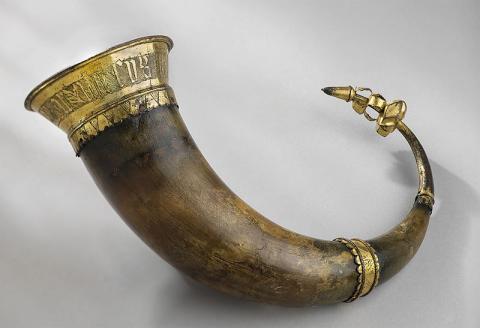[20] Illa domus, in quā residēbant, erat quasi īnserta per parietēs, in circuitū, dē appendentibus vāsculīs dīversī generis metallī, frēnīs et cornibus circumdatīs argentō.
[21] Tunc sānctus Brendānus dīxit ministrō suō, quī solēbat pānem appōnere frātribus: “Fer prandium quod nōbīs Deus mīsit.” [22] Quī statim surrēxit: invēnit mēnsam positam, et linteāmina, et pānēs singulōs mīrī candōris, et piscēs.
[23] Cum allāta fuissent omnia, benedīxit sānctus Brendānus prandium et dīxit frātribus suīs: “Quī dat ēscam omnī carnī, cōnfitēminī Deō caelī.” [24] Residēbant igitur frātrēs et magnificābant Deum. Similiter dē pōtū, quantum volēbant. [25] Fīnīta iam coena, et opus Deī perfīnītum, dīxit praedictus vir: “Requiēscite: ecce singula lectula et bene strāta. Opus est vōbīs ut repausētis membra vestra ex labōre nimiō nāvigiī vestrī.”
notes
The palace is furnished with various utensils on the wall. When they are ready to eat, they find food and drink, and beds.
[20] dē appendentibus vāsculīs dīversī generis metallī: "with hanging vessels of different kind(s) of metal"; the equipment was hung on the walls for storage. appendentibus (ML) = pendentibus (CL).
frēnīs et cornibus: "and with bridles and (drinking) horns."
[21] ministrō suō: one of the fourteen monks, who apparently was responsible for serving the food.
[22] Quī statim surrēxit: = Quī (minister) statim surrēxit.
invēnit mēnsam positam: the table appears as if by magic.
pānēs singulōs ... et piscēs: i.e., there was one loaf and one fish for each of the travelers, another sign that this was a miraculous event.
[23] Quī dat ēscam ... Deō caelī: = cōnfitēminī Deō caelī, quī dat ēscam omnī carnī. See Psalm 135.25 (136.25): “who giveth food to all flesh (qui dat escam omni carni), for his mercy endureth forever.”
[25] Fīnīta ... perfīnītum: apparently two “nominative absolutes” (see The Latin of the Navigatio: Absolute Constructions), though fīnīta iam coena on its own could be fīnitā iam coenā.
coenā: CL would be cenā.
opus Deī: “the divine office,” i.e., the liturgy of the hours (as at 1.12); it was completed, we infer, with Compline.
ecce singula lectula: as at 6.22 preparations have been made for their visit.
vocabulary
| resideō residēre resēdī ressus | to be seated, remain seated; to stand back, stand still 20 |
| īnserō īnserere īnseruī īnsertus | to attach, affix, join [OLD 2] |
| per | through; by means of [OLD 14] |
| pariēs parietis m. | wall (of a building) |
| circuitus –ūs m. | circuit, circle; outer edge, perimeter [OLD 5] |
| appendō –pendere –pendī –pēnsum | to hang upon; to weigh out |
| vasculum (vāsculum) –ī n. | small vessel or container; jar |
| metallum –ī n. | mine; metal |
| frēnum –ī n. (frēnī –ōrum m.) | bridle, harness |
| circumdō circumdare circumdedī circumdatus | place round, build around |
| minister ministrī m. | servant, waiter, steward 21 |
| pānis pānis m. | bread |
| appōnō –pōnere –posuī –positus | to place near; appoint |
| prandium –ī n. | a midday meal, lunch |
| mittō mittere mīsī missus | to send, let go; to thrust; to put [OLD 13] |
| linteāmen –inis n. | linen cloth 22 |
| pānis pānis m. | bread |
| mīrus –a –um | marvelous, wonderful |
| candor –ōris m. | radiance; whiteness |
| piscis piscis m. | fish |
| benedīcō –dīcere –dīxī –dictum | to bless 23 |
| prandium –ī n. | a midday meal, lunch |
| ēsca –ae f. | food |
| carō carnis f. | meat, flesh |
| resideō residēre resēdī ressus | to be seated, remain seated; to stand back, stand still 24 |
| magnificiō –āre | to extoll, praise [OLD 2] |
| similiter | similarly |
| pōtus pōtūs m. | a drinking, a drink |
| fīniō fīnīre fīnīvī fīnītus | to finish 25 |
| cēna (coena) cēnae f. | dinner |
| perfīniō perfīnīre perfīnīvī or perfīniī perfīnītum | complete thoroughly |
| praedīcō praedīcere praedīxī praedictus | to say beforehand; mention |
| requiēscō requiēscere requiēvī requiētum | to rest |
| lectulum –ī n. | little couch |
| sternō sternere strāvī strātus | to lay out, spread out; scatter |
| repausō repausāre | to rest (intransitive; ML; CL to stop awhile, take a break) |
| nāvigium –iī n. | rowing (ML; CL ship; voyage) |


